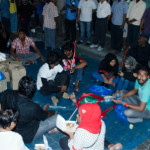Police suspected Criminal Court Chief Judge Abdulla Mohamed’s involvement in a “contract killing” after he released a murder suspect, alleges the closing statement prepared by former President Mohamed Nasheed for his trial on terrorism charges.
The office of the former president released the statement (Dhivehi) yesterday, noting that Nasheed was unable to complete it ahead of the final hearing on Friday (March 13), where he was found guilty of ordering the arrest of Judge Abdulla in January 2012 and sentenced to 13 years in prison.
Nasheed stated that he had been “continuously receiving complaints” regarding the chief judge from both his home minister and the commissioner of police.
“The latest incident I was informed of was a very tragic incident. It was reported that after Judge Abdulla released a murder suspect from detention, claiming the hospital had not submitted a document related to the case, the man went on to commit another murder,” Nasheed stated.
“Both the police and home minister characterised the incident as a direct contract killing.”
Nasheed alleged that the role assigned for Judge Abdulla under the contract was releasing the murder suspect.
“While other murder suspects are kept in detention until the conclusion of trial, the police institution believed the suspect in this case was released for that purpose and informed me thus,” the statement added.
“Contract killing”
The alleged “contract killing” Nasheed referred to involved Ibrahim Shahum Adam, who was released by Judge Abdulla on February 17, 2011 to “hold the health minister accountable” for the government-run Indira Gandhi Memorial Hospital’s failure to provide a medical report to the police.
Shahum was brought before the judge for extension of remand detention.
Following his release in February 2011, Shahum allegedly stabbed 21-year-old Ahusan Basheer to death on March 16. Police launched a manhunt the following day and took him into custody from an uninhabited island.
Shahum had been arrested in August 2010 for the murder of 17-year-old Mohamed Hussain in Malé. In March 2013, he was found guilty of the murder and sentenced to 25 years in prison.
In October last year, Shahum escaped from Maafushi jail along with another convict and was apprehended from a guesthouse in Malé six days later.
The Maldives National Defence Force (MNDF) advised MPs to stay in at night following the jailbreak.
The following month, the Criminal Court found Shahum not guilty of murdering Ahusan Basheer.
Delivering the verdict on November 20, Judge Abdulla Didi – who also presided over Nasheed’s terrorism trial – stated that Islamic Sharia requires the eyewitness testimony of two males to prove guilt in murder cases.
The state had presented one eyewitnesses to the assault and three witnesses who claimed to have heard the victim saying before he died that Shahum stabbed him.
“National security threat”
In July 2010, then-deputy police commissioner accused the chief judge of obstructing “high-profile corruption investigations” after Judge Abdulla suspended two police lawyers on “ethical grounds.”
After Judge Abdulla was taken into military custody on January 16, 2012, then-Home Minister Hassan Afeef said the chief judge was deemed a national security threat and listed 14 cases of obstruction of justice, including shielding officials of the former regime from human rights and corruption cases.
Afeef contended that the chief judge had taken “the entire criminal justice system in his fist” and alleged that the judge actively undermined cases against drug trafficking suspects and had allowed them opportunity to “fabricate false evidence after hearings had concluded”.
In his closing statement, Nasheed said he asked the police to investigate the chief judge in accordance with the law.
“After the police failed to summon Judge Abdulla for questioning, and after continuing the investigation as far as possible without questioning him, police found that Judge Abdulla constituted a threat to national security,” Nasheed explained.
“When informed of this, I ordered the home minister to take all measures necessary to safeguard the nation from this threat. I did not give directions at any time to any party, to complete a specific task in a specific manner or to take any specific measures.”
Nasheed insisted that he never ordered the police or military to arrest the judge and hold him under military custody, noting that none of the prosecution witnesses testified to any such verbal or written order.
On the day of his arrest, police summoned the chief judge for questioning. However, the High Court quashed the summons in an unprecedented move after Judge Abdulla challenged its legality.
Nasheed also referred to numerous complaints against the chief judge submitted to the Judicial Service Commission (JSC), which in November 2011 found him guilty of ethical misconduct after he made political statements in the media.
However, the Civil Court issued a stay order halting disciplinary action against the judge by the judicial watchdog or oversight body.
Related to this story
Former President Nasheed found guilty of terrorism, sentenced to 13 years in prison
Nasheed denies ordering Judge Abdulla arrest, granted three days to answer charges
Chief Judge “took entire criminal justice system in his fist”: Afeef
Civil Court dismisses ruling of own watchdog body against Chief Judge Abdulla Mohamed






Nasheed is the biggest lier on earth.
If the judge was part of contract killing, Nasheed should have done that within the legal frame work then at that time.
Since Nasheed had majority in supreme court bench in 2012, i wonder why he did not use the system to do it.
If that was the case, I wonder why he did not engage police to carry out the arrest and did the arrest by himself ?
This power crazy guy will not hesitate to tell or do anything for the sale of his own benefit.
Nasheed is the man who is behind most criminal and violence in this country.
Nasheed is the man who is promoting fundamentalism in this country .
Nasheed need to stop these and let Maldives be independent nation and then democracy will prevail.
MN is a liar as big as YAG!Our problem is we see only wrong of the other side!
The way Hero and his ilk panicked, it sounds like they can feel absolute terror.